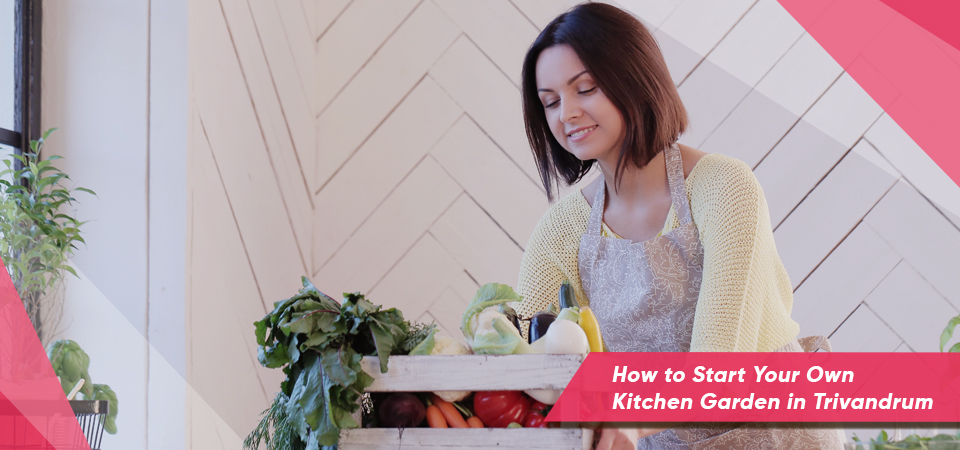Starting a kitchen garden can be a rewarding and sustainable way to enjoy fresh, organic produce right at your doorstep. In Trivandrum, with its favorable climate and rich soil, you can cultivate a variety of vegetables, herbs, and fruits throughout the year. With the increasing interest in home gardening and the influence of real estate market trends in Trivandrum, more residents are turning their homes into green spaces. This guide will walk you through the essential steps to set up and maintain a thriving kitchen garden in your Trivandrum home.
Planning Your Kitchen Garden
Choosing the right plants is vital for a successful kitchen garden. Trivandrum’s tropical climate supports a wide range of plants. Some vegetables like tomatoes, peppers, spinach, and beans thrive here, as do herbs like basil, mint, and coriander. Fruits such as papaya, banana, and pomegranate can also be grown with ease.
To ensure year-round harvest, follow a seasonal planting guide. For instance, leafy greens and root vegetables can be planted in the cooler months, while summer is ideal for fruiting vegetables. Sourcing quality seeds and seedlings from reliable local nurseries or online stores can make a significant difference in your garden’s success. Incorporating these apartment gardening tips will help you maximize your space and yield, ensuring your kitchen garden flourishes in Trivandrum’s favorable climate.
Selecting Plants for Your Kitchen Garden
Choosing the right plants is vital for a successful kitchen garden. Trivandrum’s tropical climate supports a wide range of plants. Some vegetables like tomatoes, peppers, spinach, and beans thrive here, as do herbs like basil, mint, and coriander. Fruits such as papaya, banana, and pomegranate can also be grown with ease.
To ensure year-round harvest, follow a seasonal planting guide. For instance, leafy greens and root vegetables can be planted in the cooler months, while summer is ideal for fruiting vegetables. Sourcing quality seeds and seedlings from reliable local nurseries or online stores can make a significant difference in your garden’s success.
Preparing the Soil
Soil quality is a critical factor in the health of your plants. Conduct a soil test to determine its composition and fertility. Improve your soil by adding organic matter like compost or well-rotted manure, which enhances nutrient content and drainage.
While chemical fertilizers can provide quick results, organic fertilizers are better for long-term soil health and the environment. They release nutrients slowly and improve soil structure, making your garden more resilient to pests and diseases.
Setting Up Your Garden
Setting up your garden involves a few practical steps. For raised beds, build frames using untreated wood or other safe materials. Fill them with a mix of garden soil, compost, and other organic matter. For containers, ensure they have good drainage holes and use high-quality potting mix.
Efficient watering systems like drip irrigation or self-watering containers can save time and water. Mulching with organic materials such as straw or leaves helps retain soil moisture, suppress weeds, and maintain a stable soil temperature.
Planting Techniques
Proper planting techniques can greatly influence your garden’s productivity. When planting seeds, follow the recommended depth and spacing instructions. For seedlings, transplant them carefully to avoid damaging their roots.
Companion planting, where certain plants are grown together for mutual benefit, can enhance growth and reduce pest problems. For example, planting basil near tomatoes can improve the flavor of the tomatoes and repel harmful insects.
Maintaining Your Kitchen Garden
Regular maintenance is key to a healthy garden. Water your plants consistently, preferably in the early morning or late evening to minimize evaporation. Prune dead or diseased leaves and stems to encourage new growth and prevent the spread of diseases.
Organic pest control methods include using neem oil, introducing beneficial insects, and planting pest-repellent plants. Regularly inspect your plants for signs of pests and diseases, and take prompt action if needed.
Harvesting Your Produce
Knowing when and how to harvest your produce is crucial. Harvesting at the right time ensures maximum flavor and nutritional value. For vegetables like tomatoes and peppers, pick them when they are fully ripe and firm. Herbs can be harvested continuously by snipping the leaves as needed.
Proper storage of your harvest can extend its shelf life. Some vegetables and herbs can be preserved by drying, freezing, or making into sauces and pickles.
Sustainable Gardening Practices
Adopting sustainable practices not only benefits your garden but also the environment. Composting kitchen waste creates a nutrient-rich soil amendment that can replace chemical fertilizers. Rainwater harvesting can provide an additional water source for your garden, reducing your dependence on municipal water supplies.
Encourage biodiversity by planting a variety of species and using native plants. This attracts beneficial insects, improves pollination, and helps control pests naturally.
Community and Resources
Connecting with local gardening groups and resources can enhance your gardening experience. Trivandrum has several gardening clubs and community gardens where you can share knowledge and resources. Attend workshops and courses on kitchen gardening to expand your skills and network with fellow gardeners. Incorporating these activities into your routine contributes to Healthy Living in Trivandrum Apartments.
Online resources and gardening books are also valuable tools. Websites like the Kerala Agricultural University and various gardening forums offer a wealth of information tailored to the local climate and conditions.
Conclusion
Starting a kitchen garden in Trivandrum is a fulfilling and sustainable way to enjoy fresh produce while contributing to a greener environment. Whether you live in an apartment or a house with a backyard, with careful planning and maintenance, you can create a thriving garden that provides a continuous supply of nutritious and delicious food. Remember, start small, experiment with different plants, and most importantly, enjoy the process of nurturing your little green oasis.

Leave a Reply